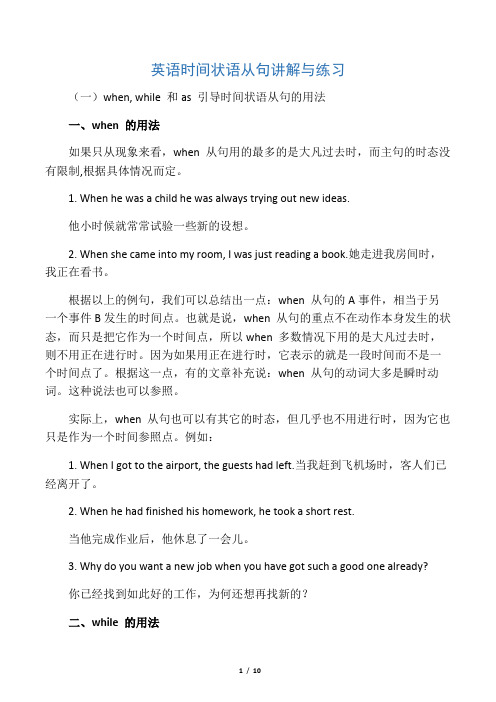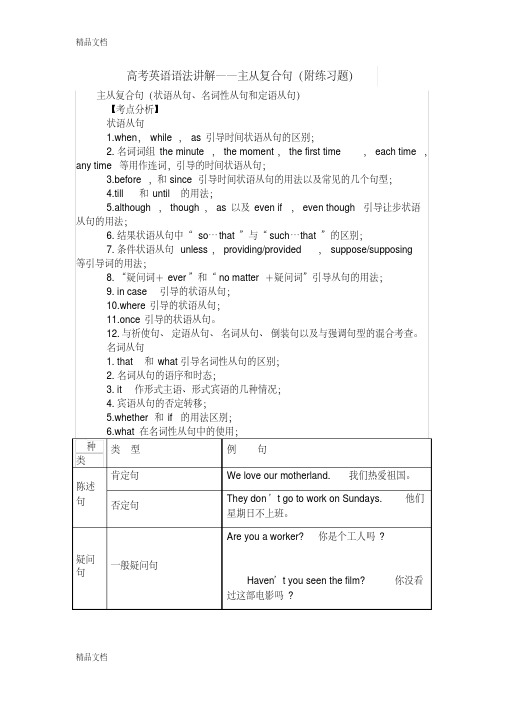as用法归纳和练习(教案).doc
while、when和as的用法区别教案资料

w h i l e、w h e n和a s 的用法区别as when while 的区别和用法as when while的用法一、 as的意思是“正当……时候”,它既可表示一个具体的时间点,也可以表示一段时间。
as可表示主句和从句的动作同时发生或同时持续,即“点点重合”“线线重合”;又可表示一个动作发生在另一个动作的持续过程中,即“点线重合”,但不能表示两个动作一前一后发生。
如果主句和从句的谓语动词都表示持续性的动作,二者均可用进行时,也可以一个用进行时,一个用一般时或者都用一般时。
1、As I got on the bus, he got off. 我上车,他下车。
(点点重合)两个动作都是非延续性的2、 He was writing as I was reading. 我看书时,他在写字。
(线线重合)两个动作都是延续性的3、 The students were talking as the teacher came in. 老师进来时,学生们正在讲话。
(点线重合)前一个动作是延续性的,而后一个动作时非延续性的二、while的意思是“在……同时(at the same time that )”“在……期间(for as long as, during the time that)”。
从while的本身词义来看,它只能表示一段时间,不能表示具体的时间点。
在时间上可以是“线线重合”或“点线重合”,但不能表示“点点重合”。
例如:1、He was watching TV while she was cooking. 她做饭时,他在看电视。
(线线重合)2、 He was waiting for me while I was working. 我工作的时候,他正等着我。
(线线重合)3、 He asked me a question while I was speaking. 我在讲话时,他问了我一个问题。
(点线重合)三、when的意思是“当……时候(at the time that)”“无论什么时候(whenever)” “一……就……(as soon as )” “在……以后(after)”。
沪教版(2024)七年级上册Unit 8 Collecting as a 分课时教案(共6课时)

Unit 8 Collecting as a hobby一、单元教学目标学习本单元后,学生能够:1. 谈论收集不同东西的有趣之处。
2. 描述人们经常收集的东西以及他们对自己的收藏的感受。
3. 表达我对不同种类收藏品的看法。
4. 解释为什么我们有博物馆。
二、课时安排三、分课时教学设计第一课时(Period 1)【单元课前预习】1.采访4人小组中的每位同学,准备好课上汇报。
可采用以下表格收集记录采访到的信2.鼓励学生在课前查找资料,准备常见的或特殊的收藏品或有关收藏的故事,并在课前预习单上写下回答用于课堂分享(课前预习单如下图所示)。
coins 硬币newspapers 报纸tickets 票cards 卡片stones 石头antiques 古董sweet wrappers 糖纸key rings 钥匙链badges 徽章dolls 娃娃toys 玩具shoes 鞋My collection/A story about collection ...__________________________________________________________________________________________________________________________________________________________________________【教学过程】Step 1阅读前通过了解各自的收藏品,了解单元主题。
1.看图回答。
教师引导学生完成第116页活动1的填空练习,从而引入单元话题,让学生了解一些常见的收藏品。
教师在PPT上展示四张图片,提问:What do these children collect?学生使用第116页活动1方框内的单词或短语进行简略回答即可。
2.学生开展“头脑风暴”,运用“Do you collect ...? / Yes, I collect ... What about you?”等句式,分组讨论自己的收藏爱好。
as.用法归纳doc

as常见用法归纳课文回顾1.Then he cuts off the leather top of the shoe as if it were the finest steak.(Book4 Unit4)2.There’s just as much a competition among countries to host the Olympics as to win an Olympic medal. (Book2 Unit2)3.As you know, our band was formed in a very unusual way. (Book2 Unit5)ing his hybrid rice, farmers are producing harvests twice as large as before. (Book4 Unit2)5. As time went by, he began making films. (Book4 Unit3)6.Now when people refer to England you find Wales included as well. (Book5 Unit2)7. They tried to paint people and nature as they really were. (Book6 Unit1)8. I want you to live as long and healthy a life as I have. (Book6 Unit3)9. As she turned around, there stood Gladys Claffern. (Book7 Unit 2)10.As far as he was concerned, what other people thought was not the most important thing. (Book7 Unit5)1. 引导时间状语从句: “当…时候,随着,一边…一边”2. 引导原因状语从句: “因为”,与because的用法相近。
初中时间状语从句语法及练习教案资

英语时间状语从句讲解与练习(一)when, while 和as 引导时间状语从句的用法一、when 的用法如果只从现象来看,when 从句用的最多的是大凡过去时,而主句的时态没有限制,根据具体情况而定。
1. When he was a child he was always trying out new ideas.他小时候就常常试验一些新的设想。
2. When she came into my room, I was just reading a book.她走进我房间时,我正在看书。
根据以上的例句,我们可以总结出一点:when 从句的A事件,相当于另一个事件B发生的时间点。
也就是说,when 从句的重点不在动作本身发生的状态,而只是把它作为一个时间点,所以when 多数情况下用的是大凡过去时,则不用正在进行时。
因为如果用正在进行时,它表示的就是一段时间而不是一个时间点了。
根据这一点,有的文章补充说:when 从句的动词大多是瞬时动词。
这种说法也可以参照。
实际上,when 从句也可以有其它的时态,但几乎也不用进行时,因为它也只是作为一个时间参照点。
例如:1. When I got to the airport, the guests had left.当我赶到飞机场时,客人们已经离开了。
2. When he had finished his homework, he took a short rest.当他完成作业后,他休息了一会儿。
3. Why do you want a new job when you have got such a good one already?你已经找到如此好的工作,为何还想再找新的?二、while 的用法相比于when 来说,while 从句的侧重点就不一样了。
while 从句的侧重点在于描述动作正在发生的状态,它的意思是:当while 事件正在发生的时候,另一件事如何如何。
定语从句教案

一、教案背景1,面向学生:高中学科:英语2,课时:13,学生课前准备:本课时为高三英语第一轮复习—-定语从句综合复习课,学生已经对定语从句基础知识进行复习。
4,运行环境:Windows7二、教学课题高三英语第一轮复习—-定语从句复习Revision of the Attributive Clause(1)着重帮助学生理解和巩固定语从句的重点和难点(2)考点:1.that与which 2.对the way的考查3.介词+关系词(3)难点:4as的使用5.对where的考查6.综合考查。
(4)运用一些口诀,选用了一部分高考题,对比练习,易错题和综合题考查和巩固学生对定语从句的掌握。
三、教材分析学生在上一课时中复习了名词性从句,本课时将重点复习定语从句。
定语从句知识点繁多,也是学生解题过程中较易出错的地方。
由浅入深,由点及面,帮助学生理解和巩固定语从句的重点和难点,四、教学方法在教学设计中采用以学生为主体、任务型教学主线,合作教学为原则,以多媒体为教学手段,利用小组合作,小组竞赛,突出语言的交际性,重视实用性,重视个体差异,采取多角度的评价方式,让全体学生以积极的态度参与教学中,从而提高英语的实际运用能力。
自然导入,层层递进。
注重将知识与能力过程与方法和情感态度与价值观三维目标相统,及时对学生的学习进行评价和激励。
五.教学过程Teaching Procedures:Step 1 GreetingsGreet students.Step 2 Review of the noun clause播放课件,通过名词性从句口诀和相应的习题简单复习上节课内容。
Step 3 Revision of the Attributive Clause(播放课件)带领学生一起回顾定语从句的口诀“一找二代三组四看五选”(T: Do you remember the five procedures? 一找先行词,二带入句中,三组成句子,四看先行词在句中的所做的成分,五选择)基础知识回顾: 关系词及其意义归纳总结:指代人who, whom , that,as指代事物which , that,as 关系代词指所属关系whose指地点where指时间when 关系副词why( 这部分学生通过小组合作,总结关系副词和关系代词T:在“三组”“四看”中,要注意关系代词在定语从句中作主语,宾语,表语,定语;关系副词在定语从中作状语)Practice:1. The teachers who/that are present at our class are all experienced teachers.2. Our class is a big family which/that consists of 14 girls and 50 boys.3. Lu Ting is the girl whose English study is very good in our class.4. The school where we are studying is very famous.5. As we all know, the 2008 Olympic Games will be held in Beijing.1.that与which1) Do you have anything __that____ you don’t unders tand?2) The only thing _that____ we can do is to give you some advice.3) Who is the man _that____ is standing there?4) Her bag, in _which__ she put all her money, has been stolen.5) She heard a terrible noise,which brought her heart into her mouth. (通过练习唤起学生对特殊用法规则的记忆,可以通过小组竞赛的形式总结回忆)只使用that应遵循的规则①先行词是everything, nothing, anything, something, much, little, none 等不定代词或由不定代词any, some, no, much, few, little, every, all等修饰时, 引导定语从句用that。
译林牛津英语8A u3 教案

绿茵教育个性化教案学生姓名:年级:科目:授课日期:月日上课时间:时分------ 时分合计: 2 小时教学目标1.复习8A unit3单词,短语,句型2.复习8A unit3语法 a. as...as的用法b. 反身代词的用法重难点导航1. 8A unit3单词,短语,句型2. 8A unit3语法 a. as...as的用法b. 反身代词的用法教学简案:一.复习单词表A.易错单词B.重点单词的用法二.重点短语及句型的用法三.语法复习四.语篇复习五.重点短语归纳六.课堂练习学生小结:教师评价:审核人签字:学生签字:教师签字:班主任签字:8上Unit 3 A day out一、复习单词表A.拼读易错单词:Australia, president, journey, main, Model,culture, support, ticket, squareB. 重要单词用法:1. Australia n. live in Australia 澳大利亚n. Australians (pl.) 澳大利亚人adj They are Australian.2. wide adj. 宽阔的wide -wider-widest a wide roadadv. open your mouth wide(区分adv. widely 抽象意思,“广泛地”read widely)3.shine vi.照耀,发光shone-shone, shines, (be shining进行时)shiny adj. 闪闪发光的Look. What a sunny day! The sun ___________________(shine)through the window.4. clear adj. 晴朗的;清晰的clearer-clearest, in the clear sky在晴朗的空中clearly adv. 清晰地think clearly, say sth. clearly, write clearly (动词+副词)5. boring adj. 乏味的bore—boring—bored( ) We felt _____ at the _____ advertisements while watching TV programs.A. bored; boringB. boring; boredC. boring; boringD. bored; bored6. finally adv. 最后in the end=at last=finally at the end of 在…末尾final adj.最后的/ n.决赛go to the final闯进决赛watch the basketball final例如:The girl was hit by a car and died _____________(final).7. interest兴趣(U)place(s) of interest 景点,风景名胜have (no) interest in sth/in doing sth.=be(not) interested in sth./in doing sth. interesting 令人感兴趣的( ) All the students are ________ in the places of ________ in Beijing.A.interesting, interestB. interested,interestC. interested, interestingD.interesting, interested8. main adj. 主要的the mainsights主要的景点main idea(s)中心思想mainly adv. 主要地The article is mainly about…9. culture n文化different cultures the culture of France/America/Australiacultural adj.文化的10.pull拉,pulls, pulled, pulling (推push) pull himself up the rocks11. luck n.幸运,运气lucky adj. 幸运的(lucky-luckier-luckiest) 反义词unluckyluckily adv. 幸运地,幸运的是反义词unluckily例如:①We will have the final exam tomorrow.Really? Good __________(luck).②You are ___________ (luck) enough to pass the exams.③____________, (luck) he lost his purse yesterday.④Don’t tell her the ____________(luck) news because it will make her sad.12. climb vt.→ climber n. 登山者,攀爬者climb, climbs, climbed, climbing13.support支持n.&vt. supported, supporting, supporter(s) n.支持者14. cheer vi. vt. & n.欢呼,喝彩cheers, cheered, cheering, cheer for our team为我们队欢呼*cheerful兴高采烈的adj.15.The trip cost(花费vt.) me one thousand yuan.=The cost(费用n.) of the trip is one thousand yuan.( ) ---What’s the ________of the trip to the World Park, Daniel?--- Taking a trip there _____100 yuan per person.A.c ost; takesB. cost; costsC. price; spendsD. price; pays16.free免费的free tickets eat for freefreely 免费地; 自由地e n.→ useful adj.(有用的→ useless adj.(无用的)care n.→ careful adj. → careless adj.help n. → helpful adj.→ helpless adj.meaning n.→meaningful adj. → meaningless adj.taste n.→ tasteful (tasty) adj. → tasteless adj.18. top n.顶部,(物体的)上面on/at the top of在……顶部in the middle of 在……中间at the bottom of 在……底部19.join, joins, joined, joining加入(某人/组织)join us/them, 加入(某人) join the swimming club(加入某组织,不能加in)join in /take part in the activity(参加活动)( ) ①–Shall we _____the singing?—That’s a good idea. Let’s ___ them.A. join in, join inB. join, joinC. join in , joinD. join, join in( ) ②—What are you talking about?—We are talking about if we can let Sandy _____ the School Reading Club.A. joinB. join inC. take partD. take part in20. The journey旅程to sp. was boring. (trip短途旅行the school trip to sp.)二、重点词组、句型用法:1. You need to exercise and keep fit.. 你需要锻炼。
英语学习(主从复合句)讲课教案

高考英语语法讲解——主从复合句(附练习题)主从复合句(状语从句、名词性从句和定语从句)【考点分析】状语从句1.when, while, as引导时间状语从句的区别;2.名词词组the minute, the moment, the first time, each time,any time等用作连词,引导的时间状语从句;3.before,和since引导时间状语从句的用法以及常见的几个句型;4.till和until的用法;5.although, though, as以及even if, even though引导让步状语从句的用法;6.结果状语从句中“so…that”与“such…that”的区别;7.条件状语从句unless, providing/provided, suppose/supposing等引导词的用法;8.“疑问词+ever”和“no matter+疑问词”引导从句的用法;9. in case引导的状语从句;10.where引导的状语从句;11.once引导的状语从句。
12.与祈使句、定语从句、名词从句、倒装句以及与强调句型的混合考查。
名词从句1. that和what引导名词性从句的区别;2.名词从句的语序和时态;3. it作形式主语、形式宾语的几种情况;4.宾语从句的否定转移;5.whether和if的用法区别;6.what在名词性从句中的使用;种类类型例句陈述句肯定句We love our motherland. 我们热爱祖国。
否定句They don’t go to work on Sundays. 他们星期日不上班。
疑问句一般疑问句Are you a worker? 你是个工人吗?Haven’t you seen the film? 你没看过这部电影吗?特殊疑问句Who is the man? 这人是谁?When do you watch TV? 你什么时间看电视?What are they doing now? 他们现在正在干什么?选择疑问句Do you want tea or coffee? Either will do. 你要茶水还是要咖啡?哪种都行。
八年级英语上册 be famous as和be famous for的区别和用法语法教案 人教新目标版

be famous as和be famous for的区别和用法语法教案我们先通过一下这个例句来看一下be famous as的用法This area is famous as a green tea producing place.这个地区作为绿茶产地而著名。
在这个例句中形容词短语“be famous as”表示“以……而出名”的意思,或确切地说,是“作为……而出名“的意思,主要是表示人“以某种身份或职业而出名”,或表示某地方“作为什么产地或地方而出名”,或表示某事物“以某种形式而出名”。
如:Mark Twin was famous as a children-story writer.马克•吐温作为儿童故事作家而著称。
This book is famous as a reference book.这本书作为参考书而出名。
注意:(1)不要与“be famous for”混淆。
词组“be famous for”表示人“以某种知识技能,作品或特征而出名”,表示某地“以某种特产或特征出名”,或表示某事“以其内容、特征、价值等而被人所知”。
如:He is famous for his skill in playing football. (他因球艺而出名。
)The area is famous for its green tea. (这个地区以产绿茶而著称。
) (2)infamous不是famous的反义词。
infamous的意思是“无耻的”、“臭名昭著的”,如:The dictator’s infamous deeds shocked the whole nation.(那个独裁者的无耻行径震惊了整个国家。
)be famous for,be famous as这一对短语都表示“以……而出(著名)”,但含义与用法有区别。
(1)当主语是表示人的名词时,be famous for表示“以某种知识、技能、作品或特征而出名”,而be famous as则表示“以某种身份而出名”。
- 1、下载文档前请自行甄别文档内容的完整性,平台不提供额外的编辑、内容补充、找答案等附加服务。
- 2、"仅部分预览"的文档,不可在线预览部分如存在完整性等问题,可反馈申请退款(可完整预览的文档不适用该条件!)。
- 3、如文档侵犯您的权益,请联系客服反馈,我们会尽快为您处理(人工客服工作时间:9:00-18:30)。
as 用法归纳和练习题一、as作副词,表示程度,意为“同样地”。
在“as...as...”,“not as/so...as...结构中的第一个as是副词,作“和/与...(不)一样”解。
Jack is as tall as his father.He doesn't speak English as/so fluently as you.二、as作介词。
1.作“如,像”解。
They got united as one man.2.作“充当,作为”解。
eg:As a writer,he was famous.三、as作连词,常用来连接主句和状语从句。
1.引导时间状语从句,作“当...的时候”解,有“随着...”之意,与while意义相近,强调两个动作同时发生;或某事一发生,另一事立即发生。
eg:He shouted aloud as her ran along.他一边往前跑,一边高声地呼喊。
I was startled as he opened the door.他一开门,我吓了一跳。
as作连词,相当于when。
eg;As a little boy (When he was a little boy)he began to learn to play piano.2.引导原因状语从句,作“因为,由于”解,与because的用法相近。
eg;I must stop writing now,as I have rather a lot of work to do.3.引导方式状语从句或比较状语从句,作“正如,(如)像”解。
例eg:As in your country,we grow wheat in the north and rice in the south.正如(像)你们国家一样,我们在北方种小麦,在南方种大米。
(方式状语从句)When at Rome,do as Romans do.入乡随俗。
(方式状语从句)Leave it as it is. 保持原状,不要动它。
4.引导让步状语从句,作“虽然,尽管”解。
这时从句常用倒装语序,即把从句中的表语、状语或动词原形放在as之前。
eg;Strange as it may seem,it is true.尽管这事看上去很奇怪,但却是真的。
Try as he might,Tom could not get out of the difficulties.不管怎样努力,汤姆还是摆脱不了困境。
Child as he is, he know s a lot.Much as I like you, I will not marry you.我虽然很喜欢你,可是不愿与你结婚。
四、as作关系代词。
1.引导限制性定语从句,用在“such...as”,“the same...as”,“as...as” “so… as”等结构中,常译作“像...一样的人(或物)”,“凡是...的人(或物)”。
例eg:He wished to be such a man as Lei Feng was.他曾希望做一个像雷锋那样的人。
My hometown is no longer the same as it was.我的家乡再也不像过去一样了。
2.引导非限制性定语从句,用来指代它前面的整个句子(即先行句)。
这个分句可以位于句首、句中或句末。
As is well known,oceans cover more than 70%of the earth.We have found such materials as are used in their factory.五、含as的固定词组的用法1.as soon as作“一…就”解,引导时间状语从句。
As soon as I get to Beijing,I'll write to you.2.as/so long as作“只要”解,As/So long as you study hard,you'll make progress.只要你努力,你就会取得进步。
3.as if/though常用来引导方式状语从句,作“好像,仿佛”解。
如果从句中讲的是非真实情况,则用虚拟语气。
She loves the child as if/though he were her own.As if/though也可用来引导表语从句,常用在“It appears/looks/seems...+as if/though”句型结构中。
It appears as if/though it is going to clear up.It seems as if/though he knew nothing about it.他好像对此事一无所知。
4.as to, as for, 作“关于,至于”解。
as with “和…也一样” eg;There is no doubt as to/for his honesty.as with (1)=as is often the case with...“那对......是常有的事”e.g. As with young birds, the time comes for the young to leave.(2)=as it\'s the same with...“正如......一样”e.g. As with running, learning English needs will.正如跑步一样,学习英语需要意志。
5.as much/many as作“多达...”,“达到...之多”解。
eg:He can earn as much as 5000 dollars a month.他每月能挣5000美元。
6.so/as far as I know作“就我所知”解,在句中作插入语。
eg:As/So far as I know,he will come here next Monday.7.as a result,as a result of表示“由于...的结果”。
eg:She died as a direct result of the accident.她的死是那次事故的直接结果。
8,as well为“也,还”之意。
as well as , 并列连词, 连接并列成分.eg:Come early,and bring your brother as well.早点来,把你的弟弟也带来。
He can speak English as well as French.他会说英语和法语9.so as to,so...as to若跟动词原形,表示目的或结果。
eg:He studied hard so as to pass the exam.他努力学习以便通过考试。
(表示目的) 10.as…, so…像…那样,…也就…;随着…,也就…As you sow,so will you reap. 种瓜得瓜,种豆得豆。
11.as a matter of fact(其实),as a whole, as a rule, as usual, as it is/was(事实上/既然如此), as it were(似乎;可以说是);as good as (和……一样好;几乎;差不多)等12、so…that;such…that的用法1、so + 形容词/副词+ that + 从句,如:This story is so interesting that I want to read it again.He spoke so quickly that I couldn't follow him.2、so+形容词/副词+a/an+单数可数名词+that+从句She is so lovely a girl that everyone loves her.3、such+a/an+形容词+单数可数名词+that+从句,如:She is such a lovely girl that everyone loves her.4、such(+adj.)+复数可数名词/不可数名词+that+从句,如:He showed such concern that people took him to be a relative.(take sb. to be 或take sb. as 把某人看作…)巩固练习1. Our neighbor has _____ ours.(北京2003)A. as a big house asB. as big a house asC. the same big house asD. a house the same big as2. What a table! I’ve never seen such a thing before. It is _____ it is long.A. half not as wide asB. wide not as half asC. not half as wide asD. as wide as not half3. I’d like to arrive 20 minutes early _____ I can have time for a cup of tea.A. as soon asB. as a resultC. in caseD. so that4. The more I think about him, the more reasons I find for loving him _____ I did.(A. as much asB. as long asC. as soon asD. as far as5. John is the tallest boy in the class, _____ according to himself. (安徽2005) (five foot/feet eight 五英尺八英寸)A. five foot eight as tall asB. as tall as five foot eightC. as five foot eight tall asD. as tall five foot eight as6. —Did you take enough money with you?—No. I needed _____ I thought I would.(2006全国II)A. not so much asB. as much asC. much more thanD. much less than7. My English teacher’s humor was ____ make every student burst into laughter.A. so as toB. such as toC. such thatD. so that8、They play all kinds of instruments and sing ____.A. alsoB. eitherC. as wellD. as well as9. Tom, ____ Jane and Rose, ____ going to the farm on foot.A. as long as;isB. as well as;areC. as long as;areD. as well as;is10. They travel at full speed by day ____ .A. and nightB. and by night as well asC. as well at nightD. as well as by night11. Mrs Black writes ____, if not better than,her husband.A. as well asB. so wellC. so wellD. as well参考答案:BCDAB ABCDD A小学9个小学生教育案例个案一:学生小田,老师,家长都反映他是个“不开窍”的孩子,一道应用题,老师课堂上讲过,家长又复习过,可做起来就是错误百出,一到考试就更不行了,别的同学背课文,一下子背出了,可他读了好多遍,还是记不住,丢三落四,常用字常会错,渐渐地学习提不起兴趣。
